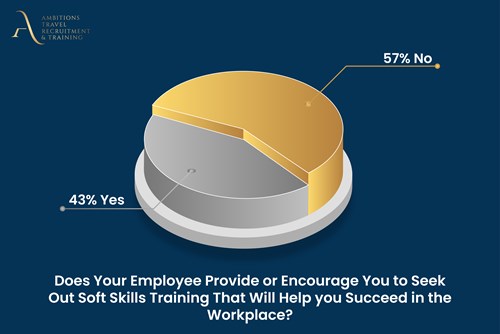Is product and destination training enough to succeed in the travel industry?

In a recent poll, we posed a simple yet crucial question to employees: "Does your employer provide or encourage you to seek out soft skills training that will help you succeed in the travel industry?" The results were disheartening, as a staggering 57% of respondents replied with a resounding "NO."

This disappointing statistic highlights a pressing issue in today's workforce—employers are neglecting the importance of soft skills training in travel recruitment. In this article, we will delve into why this is a sad trend and underscore the critical need for employers to actively support their teams in accessing and providing such training.
What Are the Benefits to a Business of Providing Soft Skills Training?
- Soft Skills are Essential: Soft skills, also known as interpersonal or people skills, are the foundation of effective communication, teamwork, leadership, and problem-solving. They include abilities such as communication, emotional intelligence, adaptability, and conflict resolution. Neglecting soft skills training hinders employee growth and ultimately impacts organisational success.
- Competitive Advantage: Companies that invest in their employees' soft skills development gain a significant competitive advantage. Soft skills empower employees to collaborate effectively, adapt to change, and lead with empathy, ultimately driving innovation and productivity.
- Employee Well-being: Employees who feel supported and empowered are more likely to be engaged and satisfied in their roles. Neglecting soft skills training can lead to employee frustration and disengagement, resulting in high turnover rates and associated costs.
The Importance of Employers Encouraging Soft Skills Training
- Improved Productivity: Soft skills training enhances employee efficiency and collaboration. Effective communication and conflict resolution skills reduce workplace misunderstandings and conflicts, leading to smoother operations.
- Enhanced Leadership: Leadership roles often require strong soft skills. Employers who invest in leadership development programs empower their teams to take on leadership responsibilities and inspire others effectively.
- Better Customer Service: Soft skills like empathy and active listening are vital in providing exceptional customer service. Employees with refined soft skills can build stronger customer relationships and improve customer satisfaction.
- Adaptation to Change: Soft skills like adaptability and resilience are crucial in a rapidly evolving business environment. Encouraging employees to develop these skills ensures they can handle change and uncertainty effectively.
What Will Happen If Employers Don't Provide Soft Skills Training?
- Decline in Employee Engagement: A lack of soft skills training can lead to decreased employee engagement, resulting in lower productivity and higher turnover rates.
- Missed Opportunities: Companies that don't prioritise soft skills development may miss out on innovative ideas, effective problem-solving, and growth opportunities.
- Negative Organisational Culture: Without effective communication and conflict resolution skills, workplace conflicts can escalate, leading to a toxic organisational culture.
- Reduced Customer Satisfaction: Poorly developed soft skills can result in dissatisfied customers and harm a company's reputation.
Statistics Speak Volumes
To emphasise the importance of soft skills training in travel recruitment, consider these statistics:
- According to a survey by LinkedIn, 57% of senior leaders believe soft skills are more important than hard skills.
- A study by the National Association of Colleges and Employers (NACE) found that communication skills are the top-quality employers seek in job candidates.
- The World Economic Forum's "Future of Jobs Report" lists complex problem-solving, critical thinking, and creativity as some of the most important skills for the workforce.
Conclusion
The evidence is clear: soft skills are not just nice-to-haves; they are essential for success in the modern travel industry. Employers must recognise the importance of encouraging their teams to access and provide soft skills training.
Neglecting this crucial aspect of professional development not only hampers employee growth but also jeopardises an organisation's ability to thrive in a competitive market. While product and destination knowledge are undeniably crucial, it’s incomplete without the essential soft skills needed to have a career within the travel industry.
- Consider the scenario of a newly promoted travel sales manager who’s proven their sales prowess but hasn’t received any people management training.
- A travel consultant who doesn’t know how to overcome objections and ask for the booking.
- The customer service executive who doesn’t know how to communicate effectively with an irate customer.
- Picture a team of home workers and their manager who feel isolated, stressed and on the verge of burnout and feeling a complete lack of interest in their situation.
- What about the new employee who knows nothing about the travel industry.
In all cases, the absence of essential soft skills travel training can lead to frustration, dissatisfaction, and ultimately, a desire to seek new opportunities elsewhere or outside of the travel industry.
It's time for employers to take action, invest in soft skills training, and empower their teams to succeed.
Ambitions Travel Recruitment and Training are staunch advocates of investing in a team’s learning as the best means of achieving business success. In this vein, we have collaborated with industry experts to create FREE essential, soft skills, eLearning specifically for the travel sector. All of these courses are FREE – visit www.ambitionstraveltraining.com to learn more.




